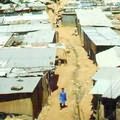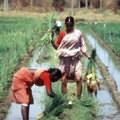|
美國,華盛頓特區,2003-07-10(ENS)-
一份在2003年7月10日發表的新報告指出,為了遏止全球環境惡化、減緩貧窮問題加遽,必須要提高公眾參與的程度。報告中說道,提高決策透明化與公民責任,能夠讓自然資源的管理更為公平而有效,因此呼籲世界各國政府在實施任何影響生態系統的決策時,應徵詢在地社區的意見,並將生態環境衝擊因素納入經濟措施的決策考量內。
世界資源學會主席列許(Jonathan Lash)表示︰「改善環境政策最直接的途徑之一,就是環境決策過程的民主化。」
這份報告名為:《世界資源2002至2004:為地球做決策──平衡、發聲與權力》,是由聯合國發展計畫署(UNDP)、聯合國環境規劃署(UNEP)、世界銀行與世界資源學會(WRI)共同發布的。
該報告特別指出,雖然已採取大規模行動,成功說服不同投資者瞭解環境保護的必要,但也同時警告,若要抵擋全球環境惡化和貧窮問題的擴張,這些努力必須加以持續與強化。

聯合國環境規劃署署長多佛(Klaus Toepfer)說︰「如今政府、企業、民間團體和公民都逐漸瞭解該做什麼做並採取行動,但地球上許多維生系統持續遭受破壞足以證明,我們所做的遠遠不足,迫切需要更一致、更集中的行動。」
報告中的數據顯示,人類對生態系統的依賴越來越徹底,但支持所有生命的生態系統卻急速惡化。例如,每6人之中就有1人依賴魚類提供其所需蛋白質,但全球有75%的漁場遭濫捕或已經瀕臨生態系統的供給極限。約3億5千萬人直接依賴森林維生,但自從農業時代開始至今,地球的森林覆蓋率降低了46%。
報告指出,全球貧窮問題似乎正在上升─—全球近一半人口每天依靠少於兩美元維生。世界銀行環境部主任喬治艾娃博士(Dr. Kristalina
Georgieva)表示︰「窮困的社群更加依賴自然資源做為生活必需品和收入,因此在失當的環境管理下特別脆弱。他們雖然具有運用資源的合法權利,卻不太可能握有這些資源的財產權。」
報告還顯示,如果生態系統不能永續經營,貧窮問題將無法克服;如果不能使掌握權力、資金的人士對自身行為負責,生態系統將無法免於被破壞。此外,公眾自政府、企業與非政府組織取得資訊的管道,也被視為改善環境績效的必要條件。作者們主張,更大的透明度與責任感將促成更公平、有效的自然資源經營──通常也是更公平的管理。「在關乎人民健康與福祉的議題上,民眾較願意參與政府的決策制定。」列許表示。

由世界資源學會與其他24個民間社團共同合作的「行動倡議(The Access
Initiative)」計劃,彙整一份針對9個國家的研究報告中顯示,提升決策過程中的透明度、廣泛性與責任感方面已有所進展,但在立法與執行面上仍有待改進。
4個參與報告的組織已承諾透過「里約宣言第十條夥伴關係」(The Partnership for Principle
10),與歐洲聯盟、世界自然保育聯盟、英國、智利、匈牙利、義大利、墨西哥、瑞典、烏干達等國政府及世界各地的非政府組織合作,改善環境管理。
聯合國發展計畫署執行長布朗(Mark Malloch
Brown)說︰「本署的主要工作方針是強化民間社區的聲音—特別對於貧窮與邊緣人口,政策的改變將衝擊他們的生計與環境」這項結盟的命名源自1992年發表的里約宣言,其中呼籲當政策制定影響環境時,應增加公眾參與的程度。
全文與圖片詳見:
http://ens-news.com/ens/jul2003/2003-07-10-10.asp
版權歸屬Environment News Service(ENS),環境資訊協會(吳家翔 譯,李秉璋
蔡麗伶審校)
|
|
WASHINGTON, DC, July 10, 2003 (ENS)–Increased public participation is
needed to stem the deterioration of the world's environment and to slow
the growth of global poverty, according to a new report released today.
Greater transparency and accountability can lead to fairer and more
effective management of natural resources, finds the report, which calls
on governments to reach out for local community input in decisions that
affect ecosystems and to integrate environmental impacts into economic
decision making."Democratization of environmental decision making is
one of the most direct routes to better environmental decisions," said
Jonathan Lash, president of the World Resources Institute.
The report, "World Resources 2002-2004: Decisions for the Earth -
Balance, Voice and Power," was published jointly by the World Resources
Institute, the World Bank, the United Nations Development Program (UNDP),
and the United Nations Environment Program (UNEP).
It notes that great strides have been made and successes achieved in
convincing different stakeholders that protection of the environment is
critical, but warns that these efforts must be sustained and built upon if
global poverty and environmental degradation are to be tackled.

"Governments, businesses, civil society and the individual citizen are
more aware of what needs to be done and are certainly taking action," said
UNEP Executive Director Klaus Toepfer. "But, as evidenced by the continued
erosion and collapse of so many of the planet's life support systems, it
is not nearly enough and more concerted, focused, action is urgently
needed."
Statistics from report indicate an overwhelming human dependence on
rapidly deteriorating ecosystems that support all life.
For example, one out of every six humans depends on fish for protein
needs, yet 75 percent of the world's fisheries are over-fished or fished
at their biological limit.
Some 350 million people are directly dependent on forests for their
survival, with global forest cover declining by 46 percent since
pre-agricultural times.
The report notes that global poverty appears to be on the rise - nearly
half of the world's population lives on less than $2 a day.
"Poor communities are particularly vulnerable to failed environmental
governance, since they rely more heavily on natural resources for
subsistence and income," said Dr. Kristalina Georgieva, director of the
Environment Department of The World Bank. "They are less likely to share
in property rights that give them legal control over these resources."
Poverty can not be overcome without sustainable management of
ecosystems, the report says, and ecosystems can not be protected from
abuse without holding those with wealth and power accountable for their
actions.
The report identifies public access to information from governments,
business, and non-governmental organizations as a necessary precursor to
improved environmental performance. Its authors contend that greater
transparency and accountability can lead to fairer and more effective
management of natural resources - and to fairer governance in general.
"People are willing to engage their governments on decisions that bear
so directly on their health and well-being," Lash said.

A nine country study compiled by The Access Initiative - a
collaboration of the World Resources Institute and 24 civil society
groups, indicates that while some progress has been made in promoting
transparency, inclusiveness, and accountability in environmental
decision-making, much remains to be done to improve both law and practice.
The four organizations that joined forces to produce the report have
committed to improve environmental governance through the Partnership for
Principle 10, in collaboration with the European Union, the World
Conservation Union, the governments of the United Kingdom, Chile, Hungary,
Italy, Mexico, Sweden, and Uganda, and non-governmental organizations from
around the world.
"It is a central tenet of UNDP's work to strengthen the voices of civil
society, in particularly the poor and the marginalized in shaping the
policies that impact their livelihoods and the environment," UNDP
Executive Administrator Mark Malloch Brown said.
The coalition is named after the section of the 1992 Rio Declaration
that called for increased public participation in decision making that
affects the environment.
http://ens-news.com/ens/jul2003/2003-07-10-10.asp |
